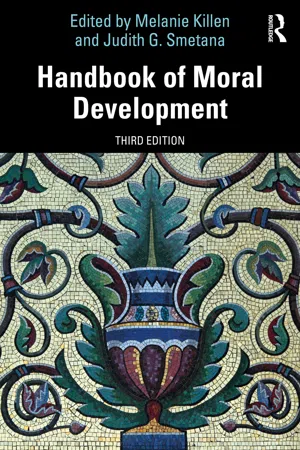
Handbook of Moral Development
- 464 pages
- English
- ePUB (mobile friendly)
- Available on iOS & Android
Handbook of Moral Development
About This Book
The Handbook of Moral Development is the definitive source of theory and research on the origins and development of morality in childhood and adolescence. It explores morality as fundamental to being human and enabling individuals to acquire social norms and develop social relationships that involve cooperation and mutual respect.
Since the publication of the second edition, groundbreaking approaches to studying moral development have invigorated debates about how to conceptualize and measure morality in childhood and adolescence. The contributors of this new edition grapple with these questions from different theoretical perspectives and review cutting-edge research. The handbook, edited by Melanie Killen and Judith G. Smetana, includes chapters on parenting and socialization, values, emergence of prejudice and social exclusion, fairness and access to resources, moral reasoning and children's rights, empathy, and prosocial behaviors. Morality is discussed in the context of families, peers, schools, and culture. Thoroughly updated and expanded, the third edition features new chapters on the following:
- Morality in infancy and early childhood
- Cognitive neuroscience perspectives on moral development
- Social responsibility in the context of social and racial justice
- Conceptions of economic and societal inequalities
- Stereotypes, bias, and discrimination
- Victimization and bullying in peer contexts
Reflecting the interdisciplinary nature of the study of moral development, this edition contains contributions from sixty scholars in developmental science, social neuroscience, comparative and evolutionary psychology, and education, representing research conducted around the world. This book will be essential reading for scholars, educators, and students who are in the field of moral development, as well as social scientists, public health experts, and clinicians who are concerned with children and development.
Frequently asked questions
Information
Table of contents
- Cover
- Endorsements
- Half Title
- Title
- Copyright
- Dedication
- Contents
- List of Contributors
- Preface
- Acknowledgments
- Part I Morality and Development Across Persons and Contexts
- Part II Morality and Social Change
- Part III Early Morality: Interactions, Cooperation, and Fairness
- Part IV Groups, Discrimination, and Prejudice
- Part V Empathy, Emotions, and Mental States
- Part VI Parental Socialization, Education, and Values
- Part VII Prosocial Behavior, Aggression, and Violence
- Index